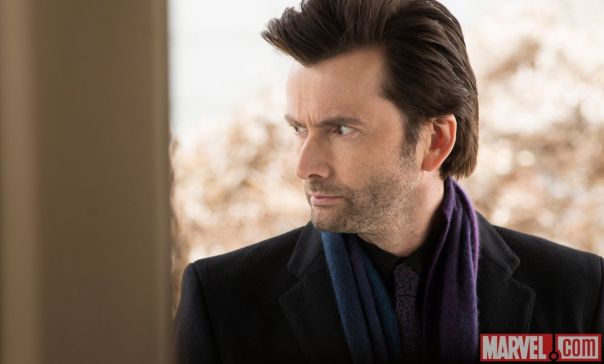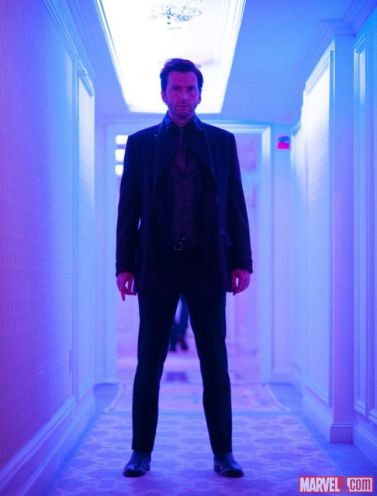Blog Archives
Jessica Jones & the Ethics of Mind Control

Marvel’s Jessica Jones poster art
Some of you may have spied the new Marvel series, Jessica Jones, on Netflix. Being a keen superhero fan I delved into this not long after it appeared. Despite a reasonably dry start I found myself getting stuck into the story within a few episodes, but following the poetic end I found my mind going over some of the key issues surrounding the big bad, Kilgrave. Here I’ll examine some of these thoughts, the main one being the ethics of mind control; to what extent can we justify allowing its existence?

David Tennant as Kilgrave in Marvel’s Jessica Jones
Who is Kilgrave? (SPOILER ALERT!)
Jessica Jones follows the forenamed Marvel character with her power of super strength as she works as a Personal Investigator. Soon we discover a deeper level to her life; that she was previously controlled by a character we learn to be Kilgrave. This man, played by the impeccable David Tennant, uses his power of mind control with a chilling lack of morality. By simply commanding something in the presence of another person, he can get that person to do whatever he wants. Whether that’s to make his dinner, be his chauffer, or in Jessica Jones’ case, become his girlfriend and even murder for him.
As we find out more about Kilgrave and what he did to Jessica, she delves deeper into the case and we become desperate for him to be stopped. It turns out Kilgrave is in love with Jessica and so as she finally homes in on catching him, when they finally meet again he allows Jessica to have free will – but threatens other innocent bystanders if she leaves him. Realising Kilgrave wants and needs her, Jessica attempts to turn the tables and control him instead. She notices on the news a family being held hostage by their father, and directs Kilgrave to accompany her to the crime scene. She convinces him to join her in venturing into the hostage location where he commands the father to let the family go. He then tells the father to put the gun in his mouth, to which Jessica explains it is not Kilgrave’s job to decide the punishment for this man, and that he must be handed over to the authorities. Luckily he agrees and instructs the man to hand himself in, however this begs the question; what would we have done if Kilgrave had still stopped this criminal but had killed him in the process, on purpose, thereby becoming himself judge, jury and executioner?
Could we allow a “good” Kilgrave to exist?
Firstly let’s consider if Kilgrave had acted what we would consider “perfectly” in that situation, i.e. he had gone into the crime scene, told the man to let the family go and then told the man immediately (without Jessica’s prompting) to hand himself in to the authorities. If Kilgrave acted appropriately with every single crime he could prevent a lot of immoral activity and help keep society safe – great. It seems Jessica at least thinks so, and she seems to consider what the possibilities are if Kilgrave could become “good”, i.e. he is then kept alive and becomes the closest he can to being a productive member of society.
However, even if this was the case, Kilgrave possesses the incredible power of being able to control whomever he wants, whenever he wants, and after finding his scientist father again he goes on to develop his powers even further – now it only takes a phone call to someone to control them, rather than physical presence. This power, although it could be used for good, is also extremely dangerous. Allowing this person to exist at all poses serious problems for humanity, even if he is considered “good”. In fact, do we only consider him to be so because he has told us that we have to think of him as such? He could easily tell us what and how to think, such that we wouldn’t even know we’re being controlled; we thought it was all our own idea. If he was in that crime situation, couldn’t he just tell a senior police officer that the best thing to do is to let Kilgrave kill him and then that authoritative person has deemed it permissible for Kilgrave to do so? This then negates the whole concept of the justice system. So even if Kilgrave was good – how could we truly know that he was good, and that he wasn’t just controlling our considerations of him being good?

Kilgrave in Marvel’s Jessica Jones
How could we keep Kilgrave under control?
Aside from this, if we did allow Kilgrave to become a productive member of society, how would we control him if he went rogue? Jessica Jones if the only one who is impervious to his powers and she has her own super powers. Does this mean we have to have a superhero to keep a lid on Kilgrave going awry? Besides, even if we did catch him, he’s a good talker even when his powers are controlled (e.g. in the room Jessica keeps him in) and can surely convince a guard (e.g. the lawyer) to set him free in exchange for something else. Being such a powerful man, there’s not much he can’t offer in a bargain. Keeping him alive will always leave a danger that he will become free again, and the possibilities for him to control other human beings means in turn that his power over others can only grow exponentially as he moves across the world.
Kilgrave: Better Alive or Dead?
Essentially then, we can’t keep Kilgrave under control. Even with superheroes like Jessica Jones, we saw how he managed to get out of his cage – and once he’s done so, he’s even more dangerous. If he was to turn good, this danger would still remain because he possesses the power to control people at his slightest whim, so if he decides to do something, no-one can really stop him – he’d be able to climb down the slippery slope of evil very quickly if he even had the tiniest inkling. So can we allow the existence of someone like Kilgrave in society? Essentially, no. To allow one person this kind of power puts humanity in grave danger. If he was to be kept alive, a solid, impermeable cage would have to be formed; one that would mean he’d never get contact with any human being, as to do so would danger not only them, but the whole of humanity.
